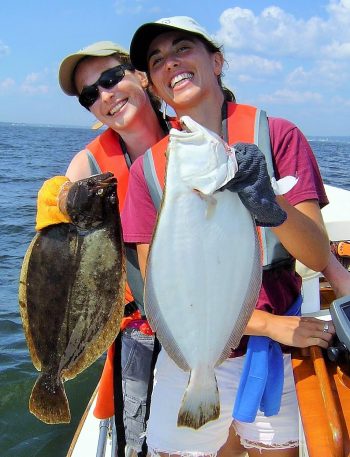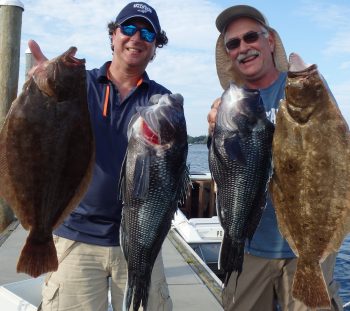
Allison Harper and Jennifer Monti with summer flounder they caught off Rhode Island due in part to a stock that rebuilt with a strong MSA and NOAA National Marine Fisheries Service.
It’s important that we stand up for the fish… if we don’t… there will be no fish to catch. That’s why when I hear political leaders talk about taking fish because “This is about states’ rights,” rather than saying, “It’s about the fish,” it sets off alarms for me.
I am not a fisheries manager, a political leader or a law of the sea expert; however, I am a recreational fisherman and charter captain who aims to do what I can to build our fisheries to abundance so there are ample fish for all.
Louisiana Congressman Garret Graves is the primary sponsor of H.R. 3094, which is a bill that would strip the National Marine Fisheries Service of its authority to manage red snapper in the Gulf of Mexico, and to turn that authority over to the five Gulf States.
This bill sets a bad precedent, and as history has proven, it will likely be bad for the fish. The Gulf States want to claim sections of the Gulf outside their three-mile limit and manage it for their interests. If this bill passes what is to stop other states from wanting to manage fish beyond their three-mile limit for parochial interests?
Such was the chase late last year with bill H.R. 3070, when congressman Lee Zeldin (R-NY) sponsored a bill to expand New York State waters so states could regulate striped bass fishing between Block Island, Rhode Island and Montauk, New York and all the waters north to the three-mile limit.
The interest of New York fishermen (particularly boats out of Montauk, NY) would have been served by this striped bass bill, however, what about the fish? No studies had been done to demonstrate the impact on striped bass. It would have changed the amount of pressure put on striped bass, possibly offsetting present data models and the delegate regulatory issues faced by managers already with recent striped bass catch limit reductions in both recreational and commercial fisheries. The bill did not move forward thanks to strong opposition from the fishing community, particularly in CT and RI.

Steve Brustein of Portland, ME and Kevin Fetzer of East Greenwich, RI with some of the fluke and black sea bass they caught off Block Island thanks to the healthy bio mass of both species.
Without a strong Magnuson-Stevens Act and a strong National Marine Fisheries Service, states will take management into their own hands, and states have a tendency to act with self interest in mind. State environmental and fisheries agencies are under state government controls, which are often subject to political pressure. Political pressure from constituents that often do not have the best interest of the fish in mind, but rather, the interest of those that make money off the fish including the fishing and tourism industries.
Before we had a national fishing law, fish stocks were depleted by states (such as the history of cod many years ago in New England). A strong MSA and National Marine Fisheries Service has rebuilt many of the fish stocks we fish recreationally in the Northeast. As recreational fishermen, we enjoy fishing rebuilt stocks (and I am thankful for this) of scup, summer flounder, striped bass, bluefish and black sea bass to name a few.
I am for a strong NOAA National Marine Fisheries Service that has control of fishing outside the three-mile limit.
Congressman Graves I am sure strikes an emotional chord with constitutes by saying his red snapper bill “is about states’ rights.” And that is what scares me. Who will have the best interest of the fish in mind if this bill passes?



Capt. Dave, maybe you need to write and post about things that you know about and not of things that you know nothing about. First of all the Red Snapper are more plentiful today as I have seen in 40 years of fishing the gulf, to the point that you can’t target any other specie without catching nothing but Red Snapper. Secondly, the recreational fishermen have been asking for years for better stock assessments which have fallen on deaf ears from NOAA and the NMFS. Now if I were to go out in the Gulf and have to try different places to find the Red Snapper I might could agree with a 9 day season, but that’s not the case, they are everywhere and plentiful. Take a good look at the Gulf Council and you will see that the membership is mostly commercial fishermen and charter captains who vote for their pocketbook, that’s why commercials fish 365 days a year and charter boats fish 45+ days while the private boats enjoy a 9 day season.
So back to HB3094, it has nothing to do with states rights but all to to with managing a public resource. Recreational fishermen have given up on the council process and have turned to Congress for help in the matter. We have had Am40 ( Sector Separation ) shoved down our throats with 97% opposition because of the corrupted Gulf Council majority of special interest groups.
I would challenge you to do some research on the topics that you chose to write about and not spew the same old EDF garbage that has been going around for years now.
In closing, I would like to inform you the the most recognized authoriy on Red Snapper Dr. Shipp claims that the Gulf could easily support a 4 fish limit and. 6 month season.
Thanks for the reply Jim.
Just want to correct a couple of items that were factually incorrect in your reply. Totally respect your point of view.
First, you said that H. R. 3094 “has nothing to do with state’s rights” however, the bill’s primary sponsor, Congressman Garret Graves of Louisiana said in a July 11 facebook post about his bill, “Plain and simple — this is about state’s rights.”
This is what scares me, states start taking fisheries into their own hands beyond the three mile limit and we will have 52 different fisheries policies, all based on the self interests of the states and not the fish.
Before we had a national fishing law, fish stocks were depleted by state fisheries. So that is why I am for a strong MSA and NOAA National Marine Fisheries Service. Many of the fish stocks we fish recreationally and commercially throughout the county have been rebuilt, thanks to this law.
In regard to fishing days, I can only imagine how difficult a nine day season is. However, we know how many fish commercial and for-hire charter fishermen take out of federal waters as they are required to report each fish they catch. So by design they are allowed to take fish up to their limit and then stop.
You said in your reply, “Sector separation (was) shoved down (your) throat”, but that’s no reason to take it out on the fish. Private anglers fish, and fish, and fish, and fish with no catch and effort reporting on the fish they take. Before you know it harvest limits are surpassed and overfishing occurs and no one is safeguarding the fish.
As I said in my original post… I am for a strong NOAA National Marine Fisheries Service that has control of fishing outside the three-mile limit.